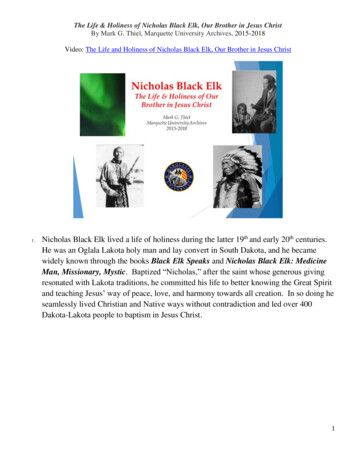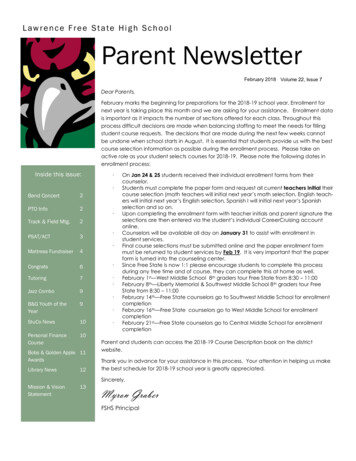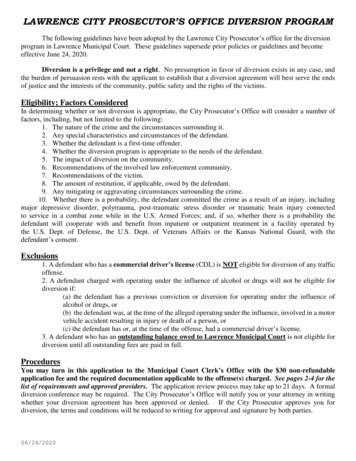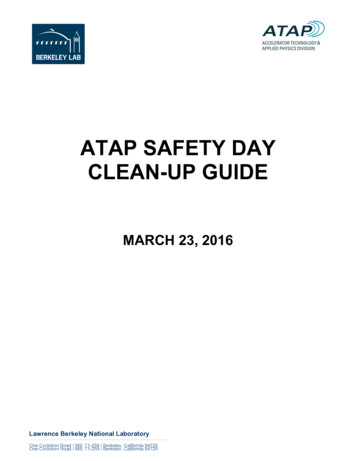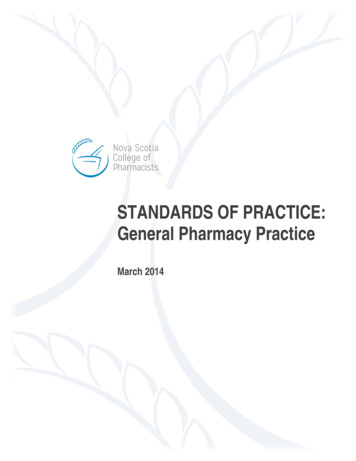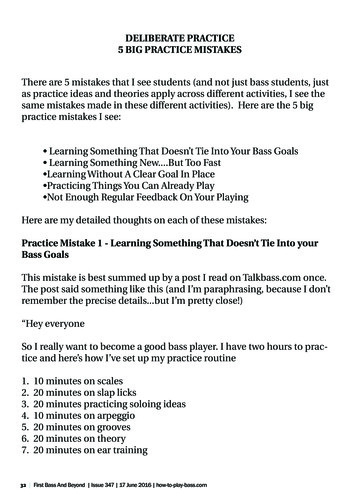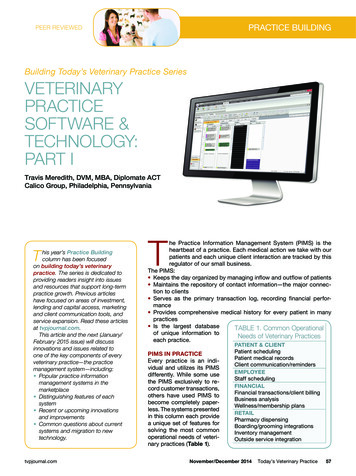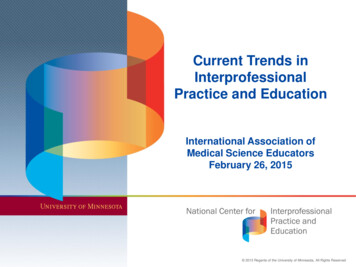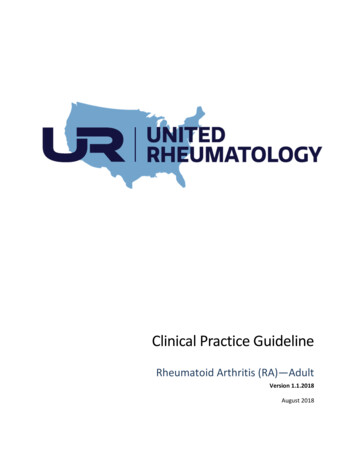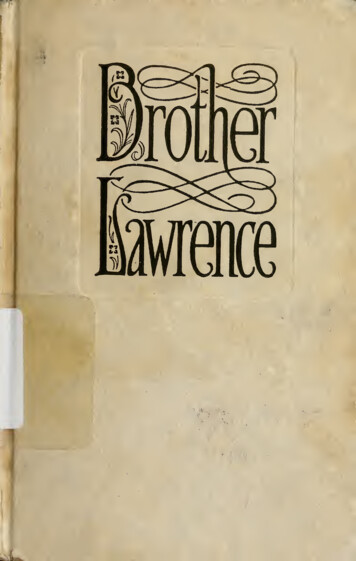
Transcription
I
LIBRARY OFWELLESLEY COLLEGEPURCHASED FROMLIBRARY FUNDS
Digitized by the Internet Archivein2010 with funding fromBoston Library tails/brotherlawrencepOOIawr
BROTHER LAWRENCE
THE COMRADE SERIESA new series of brochure-gems by recognized"favorites" among successful writers of the presentday. Each tiny jewel is attractively set in gift formand glows with a cheery message, an optimisticnote or some revelation of vital truth.Each 60Attractive Gift nJordan.PowerThe Kingship ofThe MajestyofPurposeSelfControlCalmnessBrother LawrenceThe Comrade in WhiteThe Land of Beginning AgainBy This Sign We Conquer.LawrenceLeathernShannonWilsonWilsonThree DreamsPrince of PeaceRight Living as a Fine Art.of.TwoVanDykeRed Cross TalesWhat Peace MeansAncientSTORIES WITH A MESSAGELittle Merry ChristmasThe Miracle on HermonGellibrandWhy the Robin's Breast is RedRiceThe GirfWho Walked Without FearArnoldDean.
Brother LawrenceThe Practice of the Presence of God thebest rule of a Holy LifeBeing Conversations andNicholasLetters ofHermanof Lorraine{Brother Lawrence)Translatedfrom the FrenchNew YorkChicagoTorontoFleming H. Revell CompanyPublishers of Evangelical Literature
UPCopyright, 1895,byFleming H. Revell Company.Printed in the United States of AmericaNOTE:'"Brother Lawrence"mayalso behadin acheaper form for distribution under the title of" The Practice of the Presence of God.* 9 Paper.241710.1
INTRODUCTIONby any means, as the serpent beguiled Evethrough his subtlety, so your minds should be corrupted fromthe simplicity that is in Christ."— 2 Cor. xi. 3.4ButI fear, lestThe valueof thislittlebookextreme simplicity.is itstrouble with most of the religion of the day is its" Brother Lawrence " was notextreme complexity.Thetroubled with any theological difficulties or doctrinaldilemmas.For him these did notexist.His oneaim was to bring about a conscious personalunion between himself and God, and he took the short-singleest cuthe could find to accomplishbest be described in hisown wordsit.:Theresultcan" If I dare use theexpression, I should choose to call this state thebosomof God, for the inexpressible sweetness which I tasteand experieLceWhatthere."Brother Lawrence didallcan do.Notheo-any especial theological views areneeded for the blessed " practice " he recommends.logical training norNogorgeous churches, nor stately cathedral, nor elab-orate ritual, could eitherand analtarmakeormarit.Akitchenwere as one to him; and to pick up aiii
;INTRODUCTIONivstraw from the ground was as grand a service as to"Thepreach to multitudes.he, " does not withandin the noisemeanddifferuponmyThisfrom the time of prayermyclutter ofsame timeeral persons are at thethings, I possesstime of business," saidGod inkitchen, while sevcalling for differentas great tranquillity asIifwereknees at the blessed sacrament."most helpfulbeings, letmebook, therefore, seems tolittleIknow.them bewise or simple.one of theIt fits into the lives of allhumanrich or poor, learned or unlearned,The womanat her wash-tub, or theon the road, can carry on the "prachere taught with as much ease and as muchstone-breakertice "assurance of success as the priest at his altar or themissionary in hisfield ofwork.All must feel that anything that brings the religionand povertystricken humanity, in the midst of its ignorance andits helplessness, is a priceless boon, and this is whatof Christ within reach of overworkedBrother Lawrence does.His " practicether time, nor talents, nor training." requires nei-At any moment,any occupation, under any circumstances, the soul that wants to know God can " practiseThethe presence " and can come to the knowledge.in the midst ofis with us, the God of Jacob is our refuge,"seemings " be what they may and we needlet theLordcf hosts;but to recognizethis asa continual, ever-present fact,and the inexpressible sweetnessrence attained willbecometowhich Brother Law-ours.Hannah WhitallLondon,1897.Smith.
PREFACEThis booktionshadHerman,consists of notes of several conversa-with,andletterswritten by, Nicholasof Lorraine, a lowlyand unlearned man,who, after having been a footman andsoldier,was admitted a Lay brother among the barefootedCarmelites at Paris in 1666, and was afterwardknownas "Brother Lawrence/'His conversion, which took place when he wasabout eighteen yearsold,was theresult,underGod, of the mere sight in midwinter of a dry andleaflesstree,and of thereflectionsitstirredre-specting the change the coming spring would bring.Fromthat time he grew eminently in the knowl-edge and love of God, endeavoring constantly towalk "as in His presence."Nowilderness wander-ings seem to have intervened between theand the Jordanof his experience.Asecrated man, he lived his ChristianRed Seawholly conlifethroughas a pilgrim, as a steward and not as an owner,and diedat the age of eighty, leaving ahas been as "ointment poured forth."5name which
PREFACE6Thewritten" Conversations" are supposed to have beenby M. Beaufort, Grand VicartoM. deChalons, formerly Cardinal de Noailles,by whoserecommendation the "Letters" werepublished.The bookfirsthas, within a short time, gone throughrepeated editions, and has been a means of blessingmany souls. It contains very much of that wisdom which only lips the Lord has touched canexpress, and which only hearts He has made teach-toable can receive.Maydoundthis edition alsobe blessed by God, andto the praise of the glory of His grace.re-
CONVERSATIONSFIRST CONVERSATIONThBl first timesaw Brother Lawrence was upon the3d of August, 1666. He told me that God had donehim a singular favor in his conversion at the age ofIeighteen.Thatin the winter,seeing a tree strippedofitsand considering that within a little time theleaves would be renewed, and after that the flowersand fruit appear, he received a high view of the providence and power of God, which has never since beeneffaced from his soul.That this view had perfectlyset him loose from the world, and kindled in him suchleaves,a love forGodthat he could nottellwhetherithadin-creased during the more than forty years he had livedsince.That he had been footman to M. Fieubert, the treasurer, and that he was a great awkward fellow whobroke everything.That he had desiredtobe received into a monastery,thinking that he would there beawkwardness and thefaults7madeto smart for hishe should commit, and so
;CONVERSATIONS8he shouldbut thatGodsacrifice toGod hadhislife,withitspleasures;disappointed him, he having met withnothing but satisfaction in thatstate.That we should establish ourselves in a sense ofGod's presence by continually conversing with HirrThat it was a shameful thing to quit His conversationto think of triflesandfooleries.That we should feed and nourish our souls withGod which would yield us great joyin being devoted to Him.That we ought to quicken i.e., to enliven our faith.That it was lamentable we had so little and that inhigh notions of;——;stead of taking faith for the rule of their conduct,menamused themselves with trivial devotions, which changeddaily.That the way of faith was the spirit of thechurch, and that it was sufficient to bring us to a highdegree of perfectionThat we oughtgard both toGod, with rethings temporal and spiritual, and seekto give ourselvesour satisfaction only in theHeupfulfilling oftoHiswill,whetherby suffering or by consolation, for all wouldbe equal to a soul truly resigned. That there neededfidelity in those drynesses or insensibilities and irksomenesses in prayer by which God tries our love to Himthat then was the time for us to make good and effectual acts of resignation, whereof one alone wouid oftentimes very much promote our spiritual advancement.That as for the miseries and sins he heard of dailyin the world, he was so far from wondering at themthat, on the contrary, he was surprised that there werelead usnot more, considering the malice sinners were capableof;that, for his part,he prayed for them;but knowing
CONVERSATIONSGodthatHecould remedy the mischiefs they did whenpleased, he gave himselfThat9no furthertrouble. to arrive at such resignation asGodrequires,we should watchattentively over all the passionsmingle as well inspiritual things as in those ofnature;God wouldthatpassions to thosethisifwasmywhowhicha grossergive light concerning thoseHim. Thatserve God, Itruly desire to servedesign, viz., sincerely tomight come to him (Brother Lawrence) as often aspleased, without any fear of being troublesome but;not, that I oughtno moreIifto visit him.SECOND CONVERSATIONThat he had always been governed by love, withoutselfish viewsand that having resolved to make the loveof God the end of all his actions, he had found reasons;tobe wellsatisfiedThat he waswith his method.pleased v r hen he could take up a straw from the groundfor the love ofelse,God, seekingnot even HisHimonly,and nothinggifts.That he had been long troubled in mind from a certain belief that he should be damned that all the men;in theworld could not have persuaded him to the con-trarybut that he had thus reasoned with himself aboutit:;I engaged ina religiousand I have endeavoredlifeto actonly for the love ofGod,only for Hint; whatever be-I will always continue to actpurely for the love of God,I shall have thisgood at least, that till death I shall have done all that iscomes of me, whether I beinmeto loveHim. Thatlostor saved,this trouble offour years, during which time hebut that atlasthadhe had seen thatmind had lastedsuffered much;this trouble arose
CONVERSATIONS10and that since then he had passedand continual joy. That hehad placed his sins betwixt him and God, as it were,to tell Him that he did not deserve His favors, butthat God still continued to bestow them in abundance.That in order to form a habit of conversing with Godcontinually, and referring all we do to Him, we must atbut that afterfirst apply to Him with some diligencefindHisloveinwardlyshouldexcite usa little care weto it without any difficulty.That he expected, after the pleasant days God hadgiven him, he should have his turn of pain and suffering but that he was not uneasy about it, knowing verywell that as he could do nothing of himself, God wouldfrom want offaith,his life in perfect liberty;;notfailto givehimthe strength to bearit.That when an occasion of practising some virtuehe addressed himself to God, saying, Lord, Jcannot do this unless Thou enablest me; and that then heoffered,more than sufficient.That when he had failed in his duty, he only confessed his fault, saying to God, / shall never do otherwise if You leave me to myself; it is You who must hinder my falling, and mend what is amiss. That after thisreceived strengthhe gave himself no further uneasiness aboutThat we oughtplicity,to act withspeaking toHimGodit.in the greatest sim-frankly and plainly, and im-ploring His assistance in our affairs, just as they hap-pen.That God neverfailed to grantit,ashe hadoften experienced.That he had beenlately sent intoBurgundy, to buythe provision of wine for the society, which was a veryunwelcome taskfor him, because hehad no turnfor
CONVERSATIONSbusiness,nand because he was lame and could not goby rolling himself over the casks.about the boat butThat, however, he gave himself no uneasiness aboutit,That he saidtonor about the purchase of the wine.God, // was His business he was about, and that he afterward found it very well performed. That he had beensent into Auvergne, the year before, upon the same account;that he could notbut thatitproved verytellhowthe matter passed,well.So, likewise, in his business in the kitchen (towhichhe had naturally a great aversion), having accustomedGod, andHis grace to do hishimself to do everything there for the love ofwith prayer, uponworkwell,alloccasions, forhe had found everything easy, duringemployedyears that he had beenthere.fifteen-That he was very well pleased with the post he wasnow in; but that he was as ready to quit that as theformer, since he was always pleasing himself in everycondition by doingGod.That with him the set times of prayer were not different from other times that he retired to pray, accordlittlethings for the love of;ing tc the directions of his superior, but that he did notwant such retirement, nor askest business didThat, as hethings,andforit,because his great-not divert him from God.knewas hehis obligation to loveGodin allendeavored so to do, he had no needneeded much aThat he was very sensibleof his faults, but not discouraged by them that he confessed them to God, but did not plead against Him toexcuse them. When he had so done, he peaceably resumed his usual practice of love and adoration.of a director to advise him, but that heconfessor to absolve hiir.;
CONVERSATIONS12Thatin his trouble ofmind he had consulted no-body, but knowing only by the light of faith thatGodwas present, he contented himself with directing all hisactions to Him, i.e., doing them with a desire to pleaseHim, let what would come of it.That useless thoughts spoil all; that the mischiefbegan there but that we ought to reject them as soon;asweperceived their impertinence to the matter inhand, or our salvation, and return to our communionwith God.Thatat thebeginning he had often passed his timeappointed for prayer in rejecting wandering thoughtsandThat he could never regudevotion by certain methods as some do. That,nevertheless, at first he had 7neditated for some time, hueafterward that went off, in a manner he could give nofallingbackinto them.late hisaccountThatof.allbodily mortifications and other exercisesare useless, except as they serve to arrive at the unionwithGod by lovefoundit;the shortestcontinual exercise ofhadandway to go straight to Him by alove and doing all things for Histhat hewell considered this,sake.That we oughttomakea great difference betweenand those of the will;little value, and theall.That our only business was to love andourselves in God.the acts of the understandingthat theothers,delightThatfirstallwere comparatively ofpossible kinds of mortification,ifthey werevoid of the love of God, could not efface a singlesin.That we ought, without anxiety, to expect the pardonof our sins from the blood of Jesus Christ, only en-
;CONVERSATIONSdeavoring to loveHimwithall13est sinners, asThat thewere nottomoresignalThatour hearts.seemed to have granted the greatest favorsmonumentsGodto the great-His mercy.ofgreatest pains or pleasures of this worldbe compared with what he had experiencedof both kinds in a spiritual state;so that hewascare-nothing and feared nothing, desiring only oneful forGod, viz., that he might not offend Him.That he had no scruples for, said he, when I fail inmy duty, I readily acknowledge it, saying, I am used tothing of;do so;I shallnever do otherwise ifIf I fail not, then I givethat the strengthGodI amleft to myself.thanks, acknowledgingcomes from Him.THIRD CONVERSATIONHe told methat the foundation of the spiritualhim had been a high notion and esteem ofGod inlifeinfaithwhich when he had once well conceived, he had noother care atfirstthought, that heGod;i?iight perform all his actions for the loveThat when sometimes he had not thought ofa good while, he did not disquiet himself forof God.itbut faithfully to reject every otherforbut, after havingacknowledgedhiswretchedness toGod, he returned to Him with so much the greater trustin Him as he had found himself wretched through forgetting Him.That the trust we put in God honors Him much anddraws down great graces.Thatitwas impossible not onlydeceive, but also thatwhichisHethatshould longperfectly resigned toendure everything for His sake.letGodshoulda soul sufferHim, and resolvedto
;CONVERSATIONS14That he had so often experienced the ready succorsof divine grace upon all occasions, that from thesame experience, when he had business to do, he didnot think ofitbeforehand;butwhenitwas timedowastoGod, as in a clear mirror, all thatfit for him to do.That of late he had acted thus, without anticipating care but before the experience abovementioned, he had used it in his affairs.When outward business diverted him a little fromthe thought of God, a fresh remembrance coming fromGod invested his soul, and so inflamed and transportedhim that it was difficult for him to contain himself.That he was more united to God in his outwardemployments than when he left them for devotion andit,he foundin;retirement.That he expected hereafter some great pain of bodyor mind that the worst that could happen to him was;God which he had enjoyed solong; but that the goodness of God assured him Hewould not forsake him utterly, and that He wouldgive him strength to bear whatever evil He permittedto lose that sense ofhappen to him and therefore that he feared nothing, and had no occasion to consult with anybodyabout his state.That when he had attempted to doit, he had always come away more perplexed;andthat as he was conscious of his readiness to lay downhis life for the love of God, he had no apprehensionof danger. That perfect resignation to God was a sureway to heaven, a way in which we had always suffito;cient light for our conduct.Thattobein thebeginning of the spiritualfaithful inlifewe oughtdoing our duty and denying ourselves
CONVERSATIONS15That inbut after that, unspeakable pleasures followed.difficultieswe need only have recourse to Jesus Christ,and beg His grace with that everything became easy.That many do not advance in the Christian progressbecause they stick in penances and particular exercises,;while they neglect the love of God, whichThatthisreasonthe end.isappeared plainly by their works, and was thewhy wesee solittlesolid virtue.That there needed neithernor science for goingartGod,but only a heart resolutely determined to applyitself tonothing but Him, or for His sake, and to lovetoHimonly.FOURTH CONVERSATIONHediscoursed withgreat openness ofmeheart,very frequently, and withconcerning his manner ofgoing to God, whereof some partHe toltiisrelated already.die that all consists in one hearty renunciationof everythingwhich we are sensible does not lead toThat we might accustom ourselves to a continualconversation with Him, with freedom and in simplicity.God.That we need onlyent with us, to address ourselvesthatwe may beg Histhings doubtful,weplainly seebeforeandHeGod intimately presto Him every moment,to recognizeknowing Hiswill infor rightly performing thosewhichassistance forrequires of us, offeringwe do them, andgivingHimthemthankstoHimwhen wehave done.Thatin this conversation withforHisinfiniteGod weare also em-and loving Him incessantly,goodness and perfection.ployed in praising, adoring,
CONVERSATIONS16That, without being discouraged on account of oursins,we should prayfidence, as relyingforHis grace with a perfect con-upon the infinite merits of our LordThat God never failed offering usJesus Christ.His grace at each action;that he distinctly perceivedand never failed of it, unless when his thoughts hadwandered from a sense of God's presence, or he hadforgotten to ask His assistance.it,That God always gave us light in our doubts whenwe had no other design but to please Him.That our sanctification did not depend upon changing our works, but in doing that for God's sake whichThat it was lamenwe commonly do for our own.table to see how many people mistook the means for theend, addicting themselves to certain works, which theyperformed very imperfectly, by reason of their humanor selfish regards.That the most excellent method he had found ofgoing to God was that of doing our common businesswithout any view of pleasing men,* and (as far as weGod.was a great delusion to think that the timesof prayer ought to differ from other times that we areas strictly obliged to adhere to God by action in theare capable) purely for the love ofThatit;time of action as by prayer in the season of prayer.Thathis prayerwas nothingelsebut a sense of thepresence of God, his soul being at that time insensibleand that when the appointed times of prayer were past, he found no difference, because he still continued with God, praising andto everything but divine loveblessingHimwithall his* Gal.i.;might, so that he passed his10; Eph.vi. 5, 6.
life inCONVERSATIONScontinual joy;yethopedthat17God wouldgivehim somewhat to suffer when he should grow stronger.That we ought, once for all, heartily to put ourwhole trust in God, and make a total surrender of ourselves to Him, secure that He would not deceive us.That we ought not to be weary of doing little thingsfor the love of God, who regards not the greatness ofthe work, but the love with which it is performed.That we should not wonder if, in the beginning, weoften failed in our endeavors, but that at lastwe shouldgain a habit, which will naturally produceacts in us,itswithout our care, and to our exceeding great delight.was faith, hope,and charity, by the practice of which we become unitedthat all besides is indifferent, andto the will of Godto be used as a means that we may arrive at our end,and be swallowed up therein, by faith and charity.That all things are possible to him who believes; thatthey are less difficult to him who hopes/ that they aremore easy to him who loves, and still more easy to himThat the whole substance ofreligion;whoperseveres in the practice of these three virtues.That the end we ought to propose to ourselves is tobecome, in this life, the most perfect worshipers ofGod we can possibly be, as we hope to be through alleternity.That when we enter upon the spiritual life, we shouldconsider and examine to the bottom what we are. Andthen we should find ourselves worthy of all contempt,and not deserving indeed the name of Christians sub;ject to all kinds of miseryand numberless accidents,which trouble us and cause perpetual vicissitudesinour health, in our humors, in our internal and external
CONVERSATIONS18dispositions;in fine, personsby many pains andAfter thiswhom Godwould humblelabors, as well within as without.we should not wonderthat troubles, tempta-and contradictions happen to us fromought, on the contrary, to submit ourselvestions, oppositions,men.Weto them,and bear themas long asGod pleases, asthingshighly advantageous to us.That the greater perfection a soul aspires after, themore dependent it is upon divine grace.* Being questioned by one of his own society (towhomhe was obligedtoopen himself) by what meanshe had attained such an habitual sense of God, he toldhim that, since his first coming to the monastery, hehad considered God as the end of all his thoughts anddesires, as the mark to which they should tend, and inwhich they should terminate.That in the beginning of his novitiate he spent thehours appointed for private prayer in thinking of God,so as to convince hisuponhismindof,andto impress deeplyheart, the divine existence, ratherby devoutand submission to the lights of faith, thanby studied reasonings and elaborate meditations. Thatby this short and sure method he exercised himself inthe knowledge and love of God, resolving to use hisutmost endeavor to live in a continual sense of Hissentiments,presence, and,ifpossible, never to forgetThat when he had thusinprayerHimfilled hismore.mind withgreat sentiments of that infinite Being, he went to hiswork appointed in the kitchen (for he was cook to theThere having first considered severally thesociety).*Theparticularswhich follow are collected from othercounts of Brother Lawrence.ac-
CONVERSATIONSthings his office required,19and when and how eachthing was to be done, he spentallthe intervals of histime, as well before as after his work, in prayer.That when he began his business, he said to God, witha filial trust in Him: O my God, since Thou art withme, and I must now, in obedience to Thy commands,my mind to these outward things, I beseech Theeto grant me the grace to continue in Thy presejice; andto this end do Thou prosper me with Thy assistance, receive all my works, and possess all my affections.applyAs he proceededwith hisiar conversationandin hisHimoffering toallwork he continued his familMaker, imploring His grace,his actions.When he had finished he examined himself how hehad discharged his duty if he found well, he returned;thanks toGod;ifotherwise, he asked pardon, and,without being discouraged, he set his mind right again,and continued his exercise of the presence of God as if" Thus," said he, " byhe had never deviated from it.rising after my falls, and by frequently renewed acts offaith and love, I am come to a state wherein it wouldbe as difficult for me not to think of God as it was atfirst to accustom myself to it."As Brother Lawrence had found such an advantagein walking in the presence of God, it was natural forhim to recommend it earnestly to others but his example was a stronger inducement than any argumentshe could propose.His very countenance was edifying, such a sweet and calm devotion appearing in it asAnd it was obcould not but affect the beholders.;served that in the greatest hurry of business in thekitchen hestillpreserved his recollection and heavenly
CONVERSATIONS20mindedness.Hewas never hasty nordid each thing initscomposure andtranquillityloitering,butseason, with an even, uninterruptedof"spirit.business," said he, " does not withmeThe timedifferoffrom thetime of prayer, and in the noise and clatter ofmykitchen, while several persons are at thesame timeGodin as greatcalling for different things, I possesstranquillity assacrament."ifIwere uponmyknees at the blessed
:LETTERSFIRST LETTERSince you desire so earnestly that I should communicate to you the method by which I arrived at thathabitual sense of God's presence, which our Lord, ofHis mercy, has been pleased to vouchsafe to me,I'Jiust tell you that it is with great difficulty that I amprevailed on by your importunities and now I do itonly upon the terms that you show my letter to nobody.If I knew that you would let it be seen, all the desire'.hat I have for your advancement would not be ableto determine me to it. The account I can give you isHaving found in many books different methods ofgoing to God, and divers practices of the spiritual life,I thought this would serve rather to puzzle me thanfacilitate what I sought after, which was nothing buthow to become wholly God's. This made me resolve;to give the all for the allwholly to God, that;so after having given myselfHemight take away my sin, / reHim, everything that was notas if there was none but He andnounced, for the love ofHe, and I beganto liveI in the world. Sometimes I considered myself beforeHim as a poor criminal at the feet of his judge at other*imes I beheld Him in my heart as my Father, as my;God.Iworshiped him the oftenest that I could, keep21
LETTERS22my mindingoften asIinHis holy presence, and recallingfoundsmall pain in thiswithstandingallasthe difficulties that occurred, withouttroubling or disquieting myselfdered involuntarily.madeIwhen my mind had wan-mythisbusiness asmuchthe day long as at the appointed times of prayer;allfor at all times, every hour, every minute,height ofmyGod.Such has beenmy commonentered in religion;even in themy mindmy thoughtaway frombusiness, I droveeverything that was capable of interruptingofitwandered from Him. I found noexercise, and yet I continued it, not-itpractice ever since Iand thoughIhave doneitveryimperfectly, yet I have found great advantagesby it.These, I well know, are to be imputed to the meremercy and goodness of God, because we can do nothing without Him, and / still less than any.But whenweare faithful to keep ourselves in His holy presence,andsetHimour offendingpleaseHim,always beforeHim andGod, wherewith westand in needacts,youask,favorsitHeallIitmaydis-also begets in usamayso speak, a familiarity withandthat successfully, the gracesInof.by often repeating theseand the presence of Godfine,were natural toplease, withme, whichMayIthey become habitual,rendered asififnot only hindersdoing anything thatat least wilfully, butholy freedom, and,weus, thisGiveus.Himthanks,me, for His great goodness towardcan neverhas donethings praisesufficiently admire, for themanyto so miserable a sinner as I am.Him.IAmen.am,inour Lord,Yours, etc
LETTERS2?SECOND LETTERToReverendtheNot finding my manner of life in books, although 1nave no difficulty about it, yet, for greater security, Ishall be glad to know your thoughts concerning it.In a conversation some days since with a person ofmewas a life of grace,which begins with servile fear, which is increased byhope of eternal life, and which is consummated bypure love; that each of these states had its differentpiety,he toldthe spiritualby which onesummation.arrives at last at that blessed con-stages,Ihave not followedtrary,fromallOnthese methods.know not whatIlifeinstincts, Ifound theyinto religion, I took a resolution to give myselfGod,as the best return I couldHim,for the love ofFor thefirstyeartoImakerenounceallfordis-my entranceThis was the reason why, atcouraged me.the con-Hisup tolove, and,besides.commonly employed myselfdur-ing the time set apart for devotion with the thought ofanddeath, judgment, heaven, hell,continued some years, applyingandpresence of God,rest of the day,tothemysins.my mindeven in the midst ofwhomIThusIcarefully themybusiness,considered always aswith me, often as in me.camedo the same thingduring my set time of prayer, which caused in me greatdelight and consolation. This practice produced in meAt lengthIso high an esteem forto satisfy*GodmeI supposewereinsensibly toGodthat faith alonewas capablein that point.*he means thatall distinctunsatisfactory, becausenotions he could form ofhe perceived them to bexxd-
LETTERS24my beginning, andSuch wasyet I mustfor the first ten years I sufferedsion that Imywas not devotedtopast sins always present totellyou thaThe apprehen-much.God as I wished to be,my mind, and the greatGod did me, were the matterand source of my suffering
INTRODUCTION 4ButIfear,lestbyanymeans,astheserpentbeguiledEve throughhissubtlety,soyourmindsshouldbe


